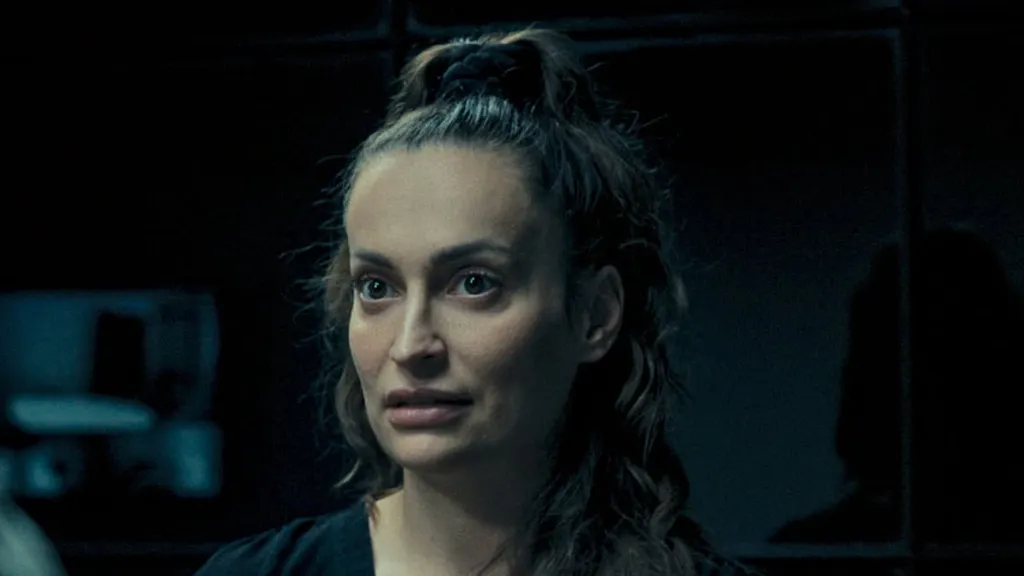You may have little interest in what goes on in a lawyer's office in Denmark. I had zero interest.
But the four-part documentary The Black Swan, which (secretly) takes place in one (bent) lawyer's office in Copenhagen, is gripping, astounding television and it knocked me for six. (I think that's a cricketing metaphor but can't say for sure as I also have zero interest in cricket.)
When, in Hamlet, Marcellus says to Horatio 'Something is rotten in the state of Denmark' he could have been talking about this show.
Let's get down to it. The central character is Amira Smajic, a Copenhagen-based lawyer who, after a decade of living a life of lies, crime and fraud wants out.
She contacts the investigative film-maker Mads Brugger, saying she needs to denounce this world and expose her clients, some of whom are old-school criminals who have convictions for violence and even murder, while others are drawn from the top of Danish society (lawyers, businessmen, the partner at a major construction company).
These two worlds can't be connected, or can they?
The Black Swan review: This astounding BBC documentary about crooked lawyers knocked me for six - and I can see why it broke ratings records with its breathtaking final twist
You may have little interest in what goes on in a lawyer's office in Denmark. I had zero interest... But the four-part documentary The Black Swan, which (secretly) takes place in one (bent) lawyer's office in Copenhagen, is gripping, astounding television.
When this was shown in Denmark last year it was so explosive it not only became one of the most watched programmes in Danish TV history but also led to a host of high-profile arrests and resignations.
Why Black Swan? Because the ancient Romans thought that black swans weren't real and it describes an event no one imagines could occur.
Denmark, remember, prides itself on being the least corrupt country in the world.
Smajic, who wears her hair in such a high, tight ponytail it would have to be painful - let it down!; give your scalp a break! Ouch! - says she's come forward as she has had enough of this life.
Her expertise is in money laundering and tax evasion, although if you are seeking to illegally dispose of toxic waste then she's your go-to person too.
She has done well. She had a Bentley at one point and 'I bought shoes like other people buy milk'. But, she says, she cannot continue.
When this was shown in Denmark last year it was so explosive it not only became one of the most watched programmes in Danish TV history but also led to a host of high-profile arrests and resignations
'If you ask me who I am today, I am a wretched human being,' she says.
'I'm tired of the lying. I'm tired of living a life where I have to size everyone up and be on my guard. I'm tired, I'm tired.' She weeps. Real tears?
All I will say is that there's a tremendous, breathtaking twist in the final episode.
Even if there were no secrets to expose, she's a fascinating character study.
Brugger sets her up to see clients, in an office with hidden microphones and cameras secreted in the electrical sockets.
There's a heart-stopping moment when one visitor makes to charge his phone from one but Smajic is not rattled.
Known in the underworld as the Ice Queen for her clam demeanour in the face of their manifold crimes, she coolly directs him to an alternative.
She offers coffee and skillfully coaxes out their confidences.
Why Black Swan? Because the ancient Romans thought that black swans weren't real and it describes an event no one imagines could occur
Where to start? There's the lawyer from a high-end firm who is willing to overlook 'fake invoice factories,' essential to money- laundering.
There's the partner in the construction company seeking to illegally dispose of toxic waste.
The man who will bury it in a field somewhere is Fasar, one of Smajic's most regular visitors.
He's a known criminal with connections to an outlawed biker gang. At one point he disappears to Pakistan for a while to whack a witness due to appear in an upcoming trial.
He asks her if she wants to watch him do it, live.
One businessman, who seems incredibly posh and has an Instagram account showing his love of Japanese food, caviar and champagne, has multiple companies that turn black money into white.
He is so entitled and pleased with himself that while he’s explaining to Smajic how his complex system works, complete with diagrams, you may find yourself shouting at the screen: ‘Gotcha!’
I can’t say I warmed to Brugger, who interviews Smajic multiple times, and comes across as cold and pompous, but it is a mighty sting.
As for Smajic herself, who arrived in Demark as a child Bosnian refugee, she is so unreadable that even Brugger can’t get to the bottom of her. What is her game?
Only in the final hour do we get a hint as to what she is truly up to, and it’s seismic.
It’s a knotty show and I don’t have the space here to go into the ethical or moral concerns, the extent of police involvement, or what the fallout has been.
Just watch, if only because, if it’s happening in Denmark, it’s happening everywhere else too.
